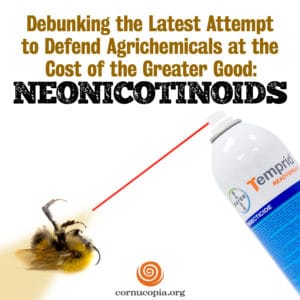
Dr. Henry Miller’s July 22 Wall Street Journal opinion piece entitled “Why the Buzz About a Bee-pocalypse is a Honey Trap” argues that bees are not in decline and that U.S. agriculture would be devastated without the use of neonicotinoid insecticides.
His article is likely in response to the National Resource Defense Council’s petition to the EPA to suspend the use of neonicotinoids, a class of non-selective, systemic insecticides. This would follow in the footsteps of the European Union’s restriction of three (out of seven) neonicotinoids in 2013 and earlier suspensions by several other countries.
Neonicotinoids, developed in the 1990s and used more heavily in the early 2000s, are the most widely used insecticides worldwide. The EPA estimates that 3.5 million pounds were applied on approximately 127 million acres worldwide in 2011. They are registered for use as an insecticide on soil, seed, and foliar applications for both residential and agricultural uses.
Research is voluminous linking neonicotinoids to bee memory loss and learning, weakened immunity, developmental injury, impaired foraging, diminished navigation and honing ability, and the loss of reproductive production of bumblebee queens.
Dr. Miller’s assertion that honey bee populations are not declining contradicts statements from the beekeeping industry along with research from both the U.S. government and public institutions. The USDA Agricultural Research Service states, “If losses continue at the 33 percent level, it could threaten the economic viability of the bee pollination industry. Honey bees would not disappear entirely, but the cost of honey bee pollination services would rise, and those increased costs would ultimately be passed on to consumers through higher food costs.”
While Colony Collapse Disorder is complex, not fully understood, and likely cannot be solved with a single policy, research has shown that insecticidal dust clouds following the planting of neonicotinoid-coated seeds can cause the loss of entire bee colonies. Neonicotinoids are used to coat over 99% of corn seed planted and are used to coat many other crops. The destructive effect of neonicotinoids on birds, bees, earthworms, aquatic insects, and beneficial insects is well researched and published in respected, peer-reviewed journals.
Neonicotinoids are water soluble and persistent chemicals having the potential to remain active in soils, wetlands, and waterways for years causing irreversible effects leading to a cascade of unintended consequences. They particularly harm organic farmers by contaminating irrigation water and airways by chemical drift and run-off during seeding and spraying. Organic growers depend on beneficial insects in the soil and air for pest prevention.
Neonicotinoids are systemic insecticides, meaning they are absorbed into all plant tissues. Their systemic effect allows the poison to move into the pollen and nectar of flowers from treated seeds, when soil is treated before sowing, and when insecticides are applied through drip irrigation within labeled rates. The insecticides within the pollen and nectar have been shown to harm beneficial insects when they feed.
Of course, because of the systemic action of these insecticides, humans are ingesting increasing levels of neonicotinoids as well, unless they are choosing certified organic food.
Dr. Miller’s article highlights the primary reason why conventional U.S. agricultural practices are fragile and unsustainable, namely the overreliance on a single class of pesticides for productivity. If U.S. agriculture were truly as dependent on neonicotinoids as Miller contends, there’s no better argument for promoting a more stable ecological approach. The reality is that many European countries have improved crop yields since banning neonicotinoids.
Honey bee pollination is estimated to be worth $215 billion annually and beneficial insect predation is conservatively estimated to be worth more than $4.5 billion annually.
As is so often the case, the environmentally responsible choice turns out to be in the best interest of the economy as a whole — albeit not as lucrative for chemical corporations and the agrochemical lobbyists and institutions their funding supports.
Dr. Linley Dixon
Farm and Food Policy Analyst
The Cornucopia Institute
The Cornucopia Institute, a farm policy research group, having just celebrated its 10th anniversary, has spent the past decade fighting “the corporate attack on organic agriculture.” Think tanks funded by agrochemical and biotechnology interests, including the Competitive Enterprise Institute, the Stanford-based Hoover Institution, the Hudson Institute and the Heartland Institute, have produced a steady stream of “cherry-picked” research denigrating organics and defending industrial agriculture, toxic chemicals and genetic engineering. Most of their analysis has simultaneously ignored studies that indicate shifting to sustainable agricultural management would pay dividends to society in terms of the environment, economy, and human health.

